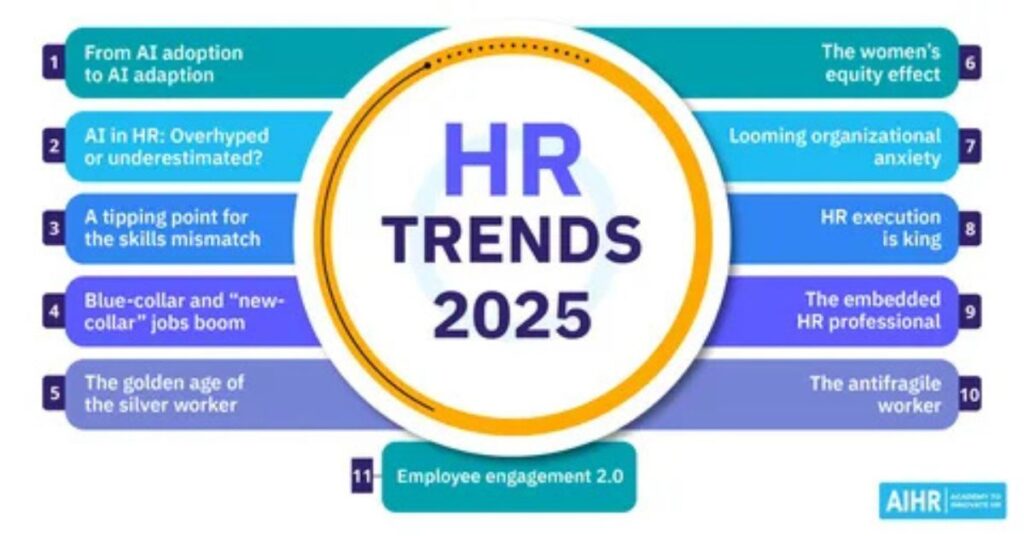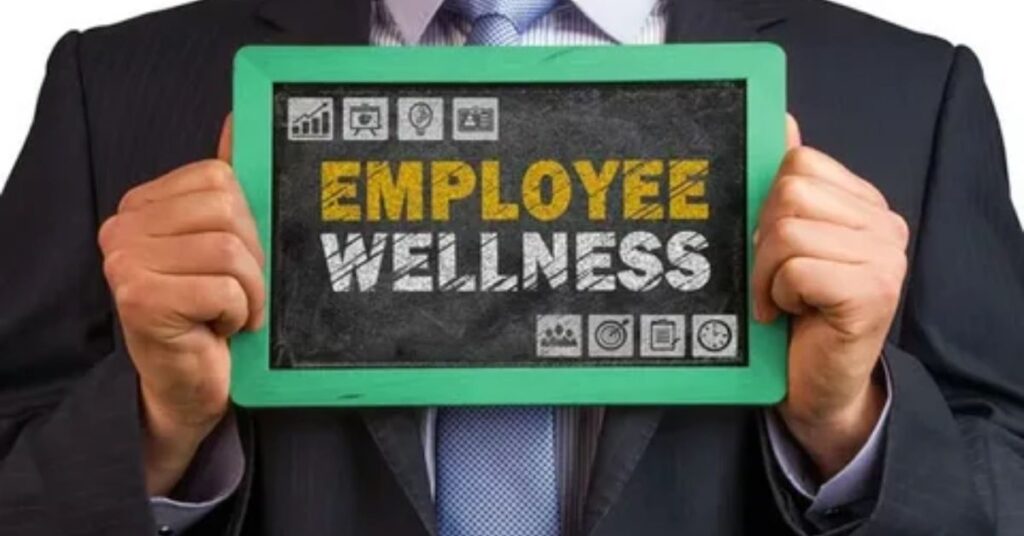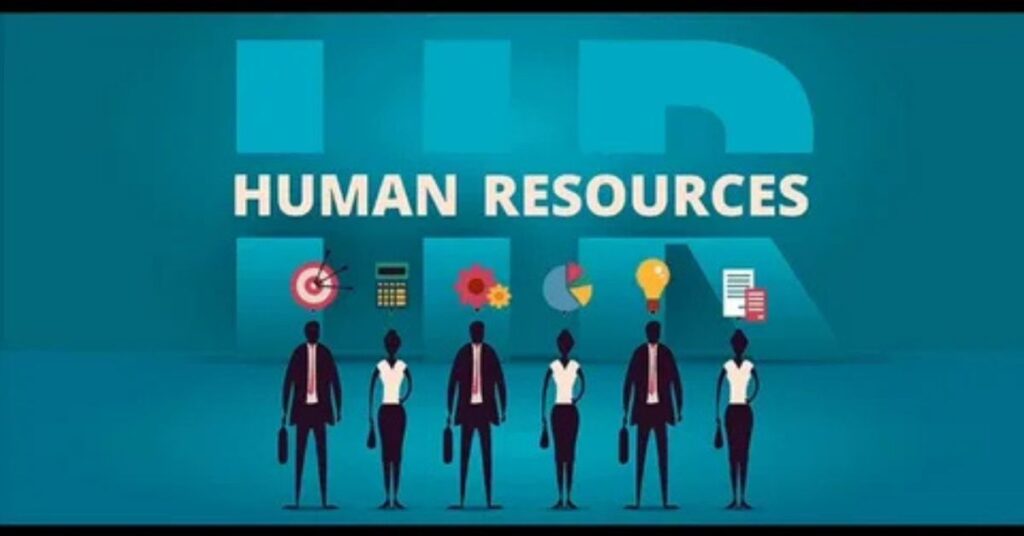The way we work, hire, and manage people is changing fast. In 2025, Artificial Intelligence (AI) is not just a trend; it is becoming a powerful tool for small and medium-sized enterprises (SMEs).
For years, big companies have used advanced tools to manage employees. But now, AI in Human Resources (HR) is opening doors for SMEs to compete, grow, and succeed.
Whether you are an SME owner, HR manager, or entrepreneur, this guide will help you understand how AI is shaping the future of HR, and how you can start leveraging it in 2025.
In this article, we will explore the future of HR with AI, especially for SMEs, and highlight game-changing HR & AI trends of 2025 that every business owner should know.
- Why AI Matters for Human Resources in SMEs
- Key Benefits of AI in Human Resources for SMEs
- Game-Changing HR & AI Trends 2025
- AI + HR: A Global Advantage for SMEs
- Real-Life Examples of AI in HR for SMEs
- Challenges of AI in HR for SMEs
- How SMEs Can Start Using AI in HR (Step-by-Step)
- Future of Human Resources with AI for SMEs
- Final Thoughts
- FAQ's
Why AI Matters for Human Resources in SMEs
Small businesses often face challenges in HR:
- Limited budgets
Many small and medium-sized enterprises (SMEs) operate on tight financial margins, which makes it difficult to invest in advanced HR technologies or hire full-time specialists. This limits their ability to compete with larger companies that already use AI-powered HR tools for efficiency and accuracy. - Few HR professionals
SMEs usually have small HR teams, sometimes just one person handling recruitment, payroll, and employee engagement. Without automation, managing these multiple roles becomes time-consuming, leading to errors and burnout. That is where AI in HR management helps automate repetitive tasks. - Difficulty in finding the right talent
Hiring skilled employees is one of the biggest struggles for small businesses. Traditional job postings do not always reach qualified candidates, and manual screening takes time.
AI recruitment systems can analyze thousands of resumes in seconds, improving talent acquisition and matching the best candidates to open roles. - High employee turnover
Without effective engagement or training programs, many employees leave SMEs for better opportunities. Artificial Intelligence in HR can predict turnover risks and help managers create personalized retention strategies, such as training, recognition, or flexible schedules.
This is where AI in HR for SMEs comes in. AI brings automation, accuracy, and insights that make HR tasks easier, faster, and more effective.
For example, AI-powered recruitment software can scan thousands of resumes in seconds, picking the best matches. This saves time, reduces errors, and ensures fairness.
According to SHRM, over 65% of SMEs plan to adopt AI in HR by 2025.
Key Benefits of AI in Human Resources for SMEs

Here is how AI is transforming HR for small and medium businesses:
1. Smarter Recruitment
AI helps SMEs hire the right people faster. Tools like LinkedIn Talent Insights and Workable use AI to scan CVs, check skills, and even predict job performance.
Example: An SME looking for a marketing manager can cut hiring time by 50% using AI-powered filters.
2. Personalized Employee Training
AI creates custom training programs for employees. Instead of boring, one-size-fits-all training, AI suggests courses that fit an employee’s role and career goals.
Tools like Coursera for Business and Udemy AI Learning Paths are already helping SMEs boost skills at low cost.
3. Boosting Employee Engagement
AI chatbots in HR (like Leena AI, Talla, or Zoho People Bot) are transforming the way employees interact with their workplace. These AI-powered HR assistants instantly answer common questions about salaries, leave policies, performance reviews, and company updates, creating a smooth and responsive HR experience.
Beyond quick replies, Artificial Intelligence in HR engagement tools can track employee mood through feedback surveys, identify burnout signs, and even suggest personalized wellness tips. This helps HR teams improve employee satisfaction, build stronger workplace culture, and reduce turnover rates.
4. Data-Driven HR Decisions
AI HR dashboards analyze data to predict resignations, track performance, and spot problems early. This helps SMEs keep good employees and avoid turnover.
Example: Gartner research shows AI in HR can reduce employee turnover by up to 30%.
5. Fair and Bias-Free HR
AI in Human Resources helps create a fair and bias-free HR system by using data-driven insights instead of personal opinions. Traditional hiring and promotions often involve unconscious bias, but AI algorithms analyze objective factors like skills, qualifications, and performance history to ensure equal opportunity for everyone.
To grow strategically, every SME should start with a clear roadmap, download a free business plan template to plan your next move with confidence.
Game-Changing HR & AI Trends 2025

Let’s look at the top HR and AI trends shaping 2025 for SMEs:
1. AI-Powered Recruitment Assistants
Recruitment chatbots and AI-driven interviews are becoming the new standard in HR automation. These smart systems screen candidates 24/7, analyze resumes, and even evaluate communication skills through natural language processing (NLP).
This helps small and medium-sized enterprises (SMEs) reduce hiring costs, save time, and improve candidate quality.
2. Global Talent Hiring
AI allows SMEs to hire talent from anywhere in the world, breaking the limits of location and time zones. With the rise of AI-powered talent-matching platforms like Upwork AI Talent Scout, Fiverr Business AI, and Toptal Smart Hire, small businesses can now find the right freelancers, remote employees, or specialists within minutes.
3. LLMO in HR
HR teams are now using ChatGPT-like AI tools to write accurate job descriptions, create employee engagement surveys, and draft HR policies in minutes. These AI-powered HR assistants understand company tone, role requirements, and even suggest inclusive language, helping SMEs save valuable time while maintaining professionalism.
4. Predictive Analytics for Workforce Planning
AI predicts future hiring needs and workforce shortages, helping SMEs stay one step ahead. Instead of reacting to sudden resignations or skill gaps, AI-driven predictive analytics uses historical HR data, performance trends, and employee turnover patterns to forecast staffing requirements.
5. Employee Well-being with AI
AI tracks stress levels, work-life balance, and overall employee productivity by analyzing patterns such as work hours, communication habits, and project timelines. This allows HR teams to identify early signs of burnout and promote a healthier work culture.
6. HR Data Security with AI
Since employee data is highly sensitive, AI also enhances cybersecurity in HR systems by monitoring and preventing data breaches in real time. Modern AI-powered HR security solutions use machine learning to detect unusual login patterns, safeguard personal records, and ensure compliance with privacy laws such as GDPR.
By integrating AI in HR data protection, small and medium-sized enterprises (SMEs) can protect payroll details, personal files, and communication logs from unauthorized access.
AI + HR: A Global Advantage for SMEs
Small businesses in the USA, UK, India, and Europe are adopting AI for HR at different speeds.
- AI-powered recruitment helps SMEs in the USA and UK quickly find top talent, while automated payroll systems reduce errors and save time. These tools enable small businesses to scale efficiently and stay competitive in 2025.
- By adopting AI-driven learning platforms, SMEs in India and the Philippines provide personalized employee training at low cost. AI HR tools also streamline attendance, performance tracking, and task management, boosting overall productivity.
- European small businesses prioritize AI in HR data security to comply with GDPR regulations. AI systems help protect sensitive employee information, ensure data privacy, and maintain trust in human resource management.
According to PwC, SMEs using AI in HR grow 2x faster than those without AI.
Real-Life Examples of AI in HR for SMEs
E-commerce SME in India: Used AI chatbots to answer employee queries, boosting employee satisfaction by 35%. The chatbot handled common HR questions about salaries, leaves, and company policies instantly, saving HR teams hours every week. Employees felt more connected and supported, leading to higher retention and a noticeable rise in workplace productivity. This simple AI upgrade turned daily HR interactions into a smooth, efficient, and engaging experience.
Challenges of AI in HR for SMEs
While AI is powerful, SMEs face some challenges:
- High initial setup costs
Implementing AI tools for HR in SMEs may seem expensive at first. However, with subscription-based plans and scalable solutions, the cost of AI adoption is dropping every year, making it accessible for small businesses. - Need for AI training
To maximize the benefits of AI in Human Resources, HR teams must undergo AI training and skill development. Proper guidance ensures employees can use HR automation tools efficiently without errors. - Data privacy concerns
Handling employee information with AI-powered HR software raises data privacy and security concerns. SMEs should implement secure AI systems that comply with GDPR or local privacy regulations to protect sensitive HR data. - Resistance to change
Introducing AI in HR processes can face employee resistance due to fear of automation. Clear communication, training, and showing how AI complements human work helps staff embrace the technology positively.
To improve daily productivity, HR teams can also explore the best AI extensions for Chrome in 2025 that automate research, scheduling, and communication tasks.
How SMEs Can Start Using AI in HR (Step-by-Step)

- Identify HR Pain Points
Before jumping into automation, SMEs should analyze where Human Resource challenges exist, such as slow recruitment, manual payroll processing, or high employee turnover. Knowing your pain points ensures you choose the right AI solutions that deliver real impact. - Choose Affordable AI Tools
Select cost-effective AI HR software designed for small and medium businesses. Platforms like Zoho People AI, BambooHR, or Freshteam offer smart automation features without heavy investments, making AI in Human Resources more accessible. - Train HR Staff
Your HR professionals should understand how to use AI dashboards, chatbots, and analytics tools confidently. Offer short AI training sessions or online courses so teams can interpret data, streamline tasks, and maximize HR automation results. - Start with One Function
Begin your AI adoption journey with a single area, such as recruitment automation or AI-powered attendance tracking. This reduces confusion, allows your team to adapt gradually, and ensures you gain measurable success before scaling further., - Expand Gradually
Once you are comfortable, introduce AI-driven training modules, employee engagement tools, and predictive HR analytics. These smart technologies can help boost productivity, improve employee satisfaction, and guide data-driven HR decisions for long-term growth.
Future of Human Resources with AI for SMEs
By 2030, AI will be a standard part of HR in SMEs. We will see:
- Modern AI chatbots for HR handle common employee questions about payroll, leave, and policies 24/7, boosting productivity and employee engagement.
- Using AI-based career mapping tools, businesses can track employee skills, suggest growth paths, and design personalized learning programs for long-term success.
- Using AI-based career mapping tools, businesses can track employee skills, suggest growth paths, and design personalized learning programs for long-term success.
- With AI in remote hiring platforms, small businesses can easily find, assess, and collaborate with global talent, breaking traditional location barriers.
The future is clear: AI will not replace HR jobs but will empower HR professionals to focus on strategy, culture, and people growth.
Final Thoughts
The future of Human Resources with AI is no longer a distant dream; it is unfolding right now in 2025. From fully automated recruitment processes to AI-driven HR chatbots, small and medium-sized enterprises are finally gaining access to tools that once only big corporations could afford.
By integrating Artificial Intelligence in HR, SMEs can hire smarter, train faster, and manage talent more efficiently, all while saving time and reducing costs. These AI-powered HR solutions are reshaping how businesses attract talent, improve engagement, and retain top performers.
What truly sets this revolution apart is the balance between technology and human touch. While AI in HR handles data, analytics, and automation, humans continue to drive empathy, leadership, and creativity, the qualities that make workplaces thrive.
FAQ’s
Will AI replace HR jobs in SMEs?
No, AI will not replace HR jobs in SMEs. Instead, AI will support HR professionals by automating boring and repetitive tasks like resume screening, payroll, or scheduling interviews. This gives HR teams more time to focus on human-centered work such as employee well-being, leadership, culture-building, and conflict management.
Think of AI as a co-pilot, not a replacement. For example, a small business can use tools like BambooHR or Zoho People to handle routine tasks, while HR managers still make final decisions.
So the future of HR in SMEs will be a mix: AI handles the data, humans handle the people.
How can SMEs afford AI tools in HR?
Many small and medium-sized enterprises (SMEs) worry about the cost of AI tools, but the good news is that most HR AI solutions are affordable and scalable. Today, there are plenty of subscription-based HR software where SMEs only pay for what they need.
For example:
Freshteam by Freshworks – Free plan for small teams.
Zoho Recruit – Low-cost AI-driven hiring.
Gusto – AI-powered payroll and employee management for small businesses.
What’s the future of human resources with AI?
The future of human resources with AI is all about balance between technology and people. In the next few years, AI will become the backbone of HR for SMEs by handling tasks like:
Smart recruitment with AI-driven candidate matching.
Personalized learning paths for employees using AI learning platforms.
Predictive analytics for employee retention and performance.
AI chatbots answering HR-related questions 24/7.
However, the human side of HR will become even more important; skills like empathy, creativity, and leadership cannot be replaced by machines.

